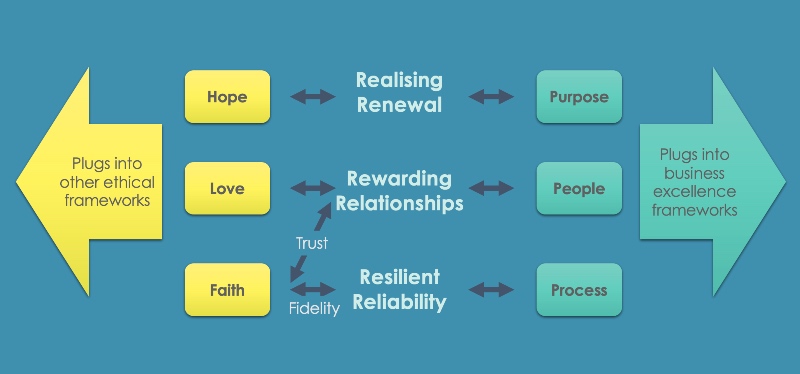Can business deliver Kingdom?
If business is to be a platform for making the world a better place, it needs to be both excellent in operation and Kingdom in purpose.
Part three of the series Is Kingdom working? by Phil Hanson and Terry Young

Is there such a thing as Kingdom business?
There are wildly different opinions on this question.
Some argue that Jesus came to build his church (e.g.: Matthew 16:18), not a business corporation. Indeed, many Christians are suspicious of business and the motives of its leaders, citing the negative impacts of commercial activities on people and communities. Among them are those who argue that there can be no such thing as a Kingdom business.
Others acknowledge that all giving and charitable work must be paid for with cash that someone, somewhere, first had to earn, so we cannot ignore the enabling role of businesses that provide meaningful employment to their employees and those of their suppliers. Businesses develop and bring to market products that bring human flourishing in all sorts of ways, so supporters may even argue that to some degree all businesses contribute to advancing the Kingdom.
Our question concerns the extent to which a well-run business can make God’s Kingdom a reality on earth. To try to answer it, we are using the RR3 Framework, described in the previous blog in this series.
Are all (Christian) businesses Kingdom businesses?

When we apply the RR criteria, Realising Renewal, Rewarding Relationships, and Resilient Reliability, we see that they point two ways – toward the yellow spiritual virtues and toward (green) best business practice.
The first insight is that the owner’s Christian intent – the existence of a yellow side to the business, in this case – does not by itself guarantee positive Kingdom impact. Similarly, an excellent company that has embraced every aspect of best practice is equally no guarantee of Kingdom performance. If business is to be a platform for making the world a better place, it needs to be both excellent in operation and Kingdom in purpose. Let’s examine the picture from both ends:
The Yellow Company
As noted, mastering the yellow virtues does not guarantee green performance.
We may love people so much that we keep problematic workers in place at personal cost to their colleagues or at the expense of operational performance. Businesses that have been established specifically to create work for those who might not otherwise find employment must still seek to compete with the best of their competitors.
A yellow company may exercise great faith in all personal dealings and invest diligently in corporate prayer for the business. Without a real appetite for perfecting the product, however, or taking the processes apart to make them simpler, faster and better, the Kingdom aspirations may never be realised.
The Green Company
Starting from the three virtues has the merit of anchoring the business to its Kingdom purpose and providing a values-based frame of reference for business decisions and governance. It will always test the business operations for integrity and wider impact.
The view when starting from the green end (business excellence) reveals a different class of gap.
Within a business context, purpose, people and process, turn out to have a much narrower focus than their Christian counterparts of hope, love, and faith. Not only may a firm’s purpose change as it pivots in a changing market, but it is exceptionally difficult for purpose to extend much beyond the business itself. Henry Ford (My life and work, Project Guttenberg) was surprisingly egalitarian in his views as an employer, but he was clear that people were at work to work. He strove to ensure that people with disablities and the physically weak could deliver on an equal footing with everyone else in his factories, but it was always to fulfil the factory’s needs, not those of the employees.
A century later, best business HR practice has gravitated toward legal compliance, rather than loving one’s neighbour on the production line or in the call centre. St Paul’s distinction between the letter that kills and the Spirit that gives life (2 Corinthians 3:6) is perhaps reflected in workplaces where we reorganise to remove workers, or where grievances drag on while due process grinds away. We are not saying here that best practice deliberately treats people badly, simply that that it is limited to written code, and can only scratch the surface of friendship or care.
Both Yellow and Green
We can see, then, the potential for a joint agenda across the RR3 Framework that sharpens the yellow virtues and extends the scope of the green. What if the purpose of a business were to include releasing the creativity of every worker so that the workplace became a joy for all? Is that even possible?
What if Realising Renewal included the physical environment as well as the community around?
How could Rewarding Relationship extend to include the families of the workforce or the business’ relationships with local churches, schools, hospitals, or even prisons?
Where could Resilient Reliability (something Henry Ford took very seriously) take a business if it were able to remain a foundational presence for the local people with effective, well-priced products, dependable employment and an enduring contribution to the local economy?
How well does excellent business live up to Kingdom?
We can already see that there is plenty of scope to fail the criteria suggested by the RR3 Framework: best business practice is unlikely to address wider issues of purpose or caring, quite apart from addressing the core faith question of how we can be perfect before God. Meanwhile, businesses that identify as Kingdom can so easily fall short of the rigours of best practice.
In the next blog we will step sideways to explore how business is impacted by the selfish behaviours characterised in Paul’s letter to the Galatians – a sort of anti-virtue perspective on work – to see what we can learn.
However, in some newer companies we have detected a desire to reach leftward and grasp the wider potential of purpose, people and process. There are businesses, for example, trying to work out what a better work/life balance could look like in an ‘always on’ world. This will be our final blog.
Image | Chiang Henry | Unsplash
Phil Hanson is an engineer by profession. For the latter part of a 30 year career in IBM, he was Lead Principal for IBM’s Manufacturing Industry Consulting Practice. Since IBM, he has been Principal Industrial Fellow at the Institute for Manufacturing at Cambridge University and a Special Advisor to UNIDO for supply chain projects in Africa. He is ordained in the Church of England.
Terry Young is a missionary kid who read science and engineering. After a PhD in lasers, he worked in R&D before becoming a professor, when he taught project management, information systems and e-business, while leading research in healthcare. He set up Datchet Consulting to have fun with both faith and work and worshipped at Baptist churches in Slough for 19 years before moving to the New Forest.
Do you have a view? Share your thoughts via our letters' page.
Baptist Times, 15/10/2022